In 2024, the best backup solar generators let you harness clean energy for any situation. The EF ECOFLOW Solar Generator DELTA2 offers a robust 1024Wh capacity and quick charging. The RIVER 2 Max is portable with a 512Wh battery, while the RIVER 2 Pro combines a 768Wh battery with surge capabilities. The Jackery Solar Generator 1000 is perfect for home appliances with its durable design. Finally, the DELTA 2 Max provides ample power output and fast charging. With features like portability and expandability, these generators cater to your diverse needs, showing you just how reliable solar power can be.
EF ECOFLOW Solar Generator DELTA2 with 220W Solar Panel
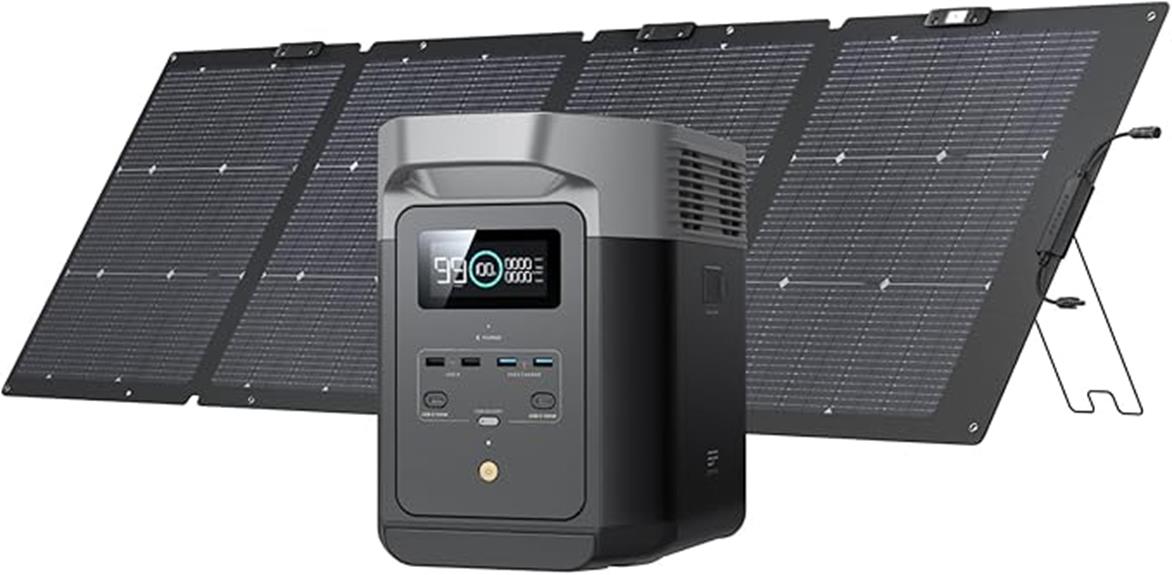
The EF ECOFLOW Solar Generator DELTA2 with its 220W Solar Panel stands out as an exceptional choice for anyone seeking reliable power on the go, especially campers and RV enthusiasts. With a robust 1024Wh LFP battery, I love how it offers over 3000 charge cycles and performs well in extreme temperatures. It charges quickly—0 to 80% in just 50 minutes using AC power. Plus, the 15 outlets, including USB-A and USB-C, make it versatile for all my devices. I appreciate the expandable capacity, allowing me to increase my power storage from 1kWh to 3kWh with additional batteries. Overall, it's a dependable solution for keeping my essential appliances running during outdoor adventures or unexpected power outages.
Best For: Those who seek reliable, portable power solutions for camping, RV trips, and home backup during outages.
Pros:
- Fast charging capabilities, reaching 80% in just 50 minutes via AC.
- Robust LFP battery with over 3000 charge cycles and excellent performance in extreme temperatures.
- Versatile connectivity with 15 outlets, including USB-A and USB-C ports, for multiple devices.
Cons:
- Initial cost may be higher compared to traditional generators.
- Expandable capacity requires additional batteries, which may not be included in the base purchase.
- Limited power output may not support all high-demand appliances simultaneously.
EF ECOFLOW RIVER 2 Max Solar Generator with 160W Solar Panel
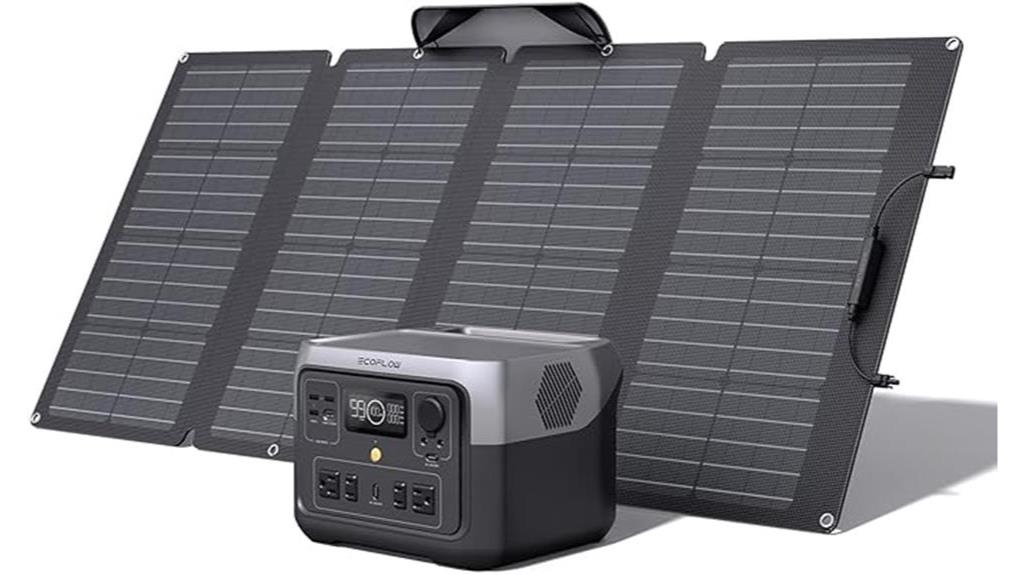
Looking for a reliable power source for your outdoor adventures or during unexpected outages? The EF ECOFLOW RIVER 2 Max Solar Generator with a 160W solar panel is a game-changer. With a capacity of 512Wh and the ability to power up to 11 devices simultaneously, it's perfect for camping, RVs, or home backup. I appreciate its rapid charging—100% in just 60 minutes via AC—and solar charging in as little as 4 hours. Plus, it boasts a long battery life with over 3000 cycles, lasting nearly a decade. The lightweight design and IP68 weatherproof solar panel make it incredibly portable and durable. Overall, it's a cost-effective option that outperforms many competitors without sacrificing reliability.
Best For: Outdoor enthusiasts, campers, and those seeking reliable backup power during outages will find the EF ECOFLOW RIVER 2 Max Solar Generator ideal for their needs.
Pros:
- Rapid charging capability, reaching 100% in just 60 minutes via AC outlet.
- Lightweight and portable design, making it easy to transport for outdoor activities.
- Long battery life with over 3000 charging cycles, ensuring durability and reliability.
Cons:
- Some users reported connectivity issues with the app.
- May not function as a true UPS for all devices, limiting its use for certain applications.
- Competitors like Jackery and Goal Zero may offer more features at similar prices.
EF ECOFLOW Solar Generator RIVER 2 Pro with 220W Solar Panel
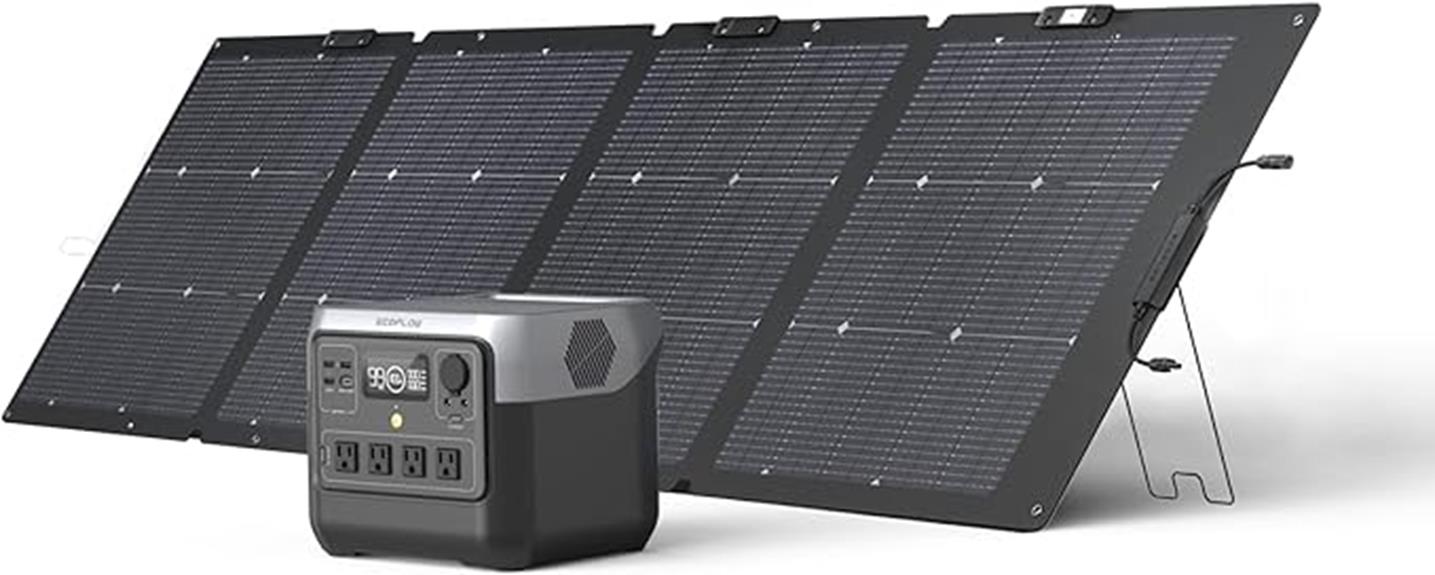
For anyone seeking a reliable power solution during outdoor adventures or unexpected outages, the EF ECOFLOW Solar Generator RIVER 2 Pro with its 220W Solar Panel stands out as an exceptional choice. Weighing just 17.2 lbs, it's incredibly portable, making it perfect for camping or emergency use. This generator boasts a robust 768Wh LiFePO4 battery with over 3000 cycles, ensuring longevity and reliability. With four AC outlets and a surge capacity of 1600W, I can power most household appliances easily. The 220W bifacial solar panel recharges the unit in just 4.3 hours, generating up to 25% more energy. Plus, the user-friendly app allows me to monitor power levels effortlessly, making it an ideal companion for any situation.
Best For: Outdoor enthusiasts, homeowners seeking backup power, and anyone needing a reliable energy source during emergencies.
Pros:
- Lightweight and portable design makes it easy to transport for camping and outdoor activities.
- Versatile charging options with solar, AC, and car charging capabilities to suit various needs.
- User-friendly app provides real-time monitoring and control of power levels and device management.
Cons:
- Limited surge capacity may not support larger appliances like electric kettles without additional units.
- Initial cost may be higher compared to traditional generators, which could deter budget-conscious buyers.
- Charging time of 4.3 hours may be less convenient in urgent situations if adequate sunlight is not available.
Jackery Solar Generator 1000 with Solar Panels
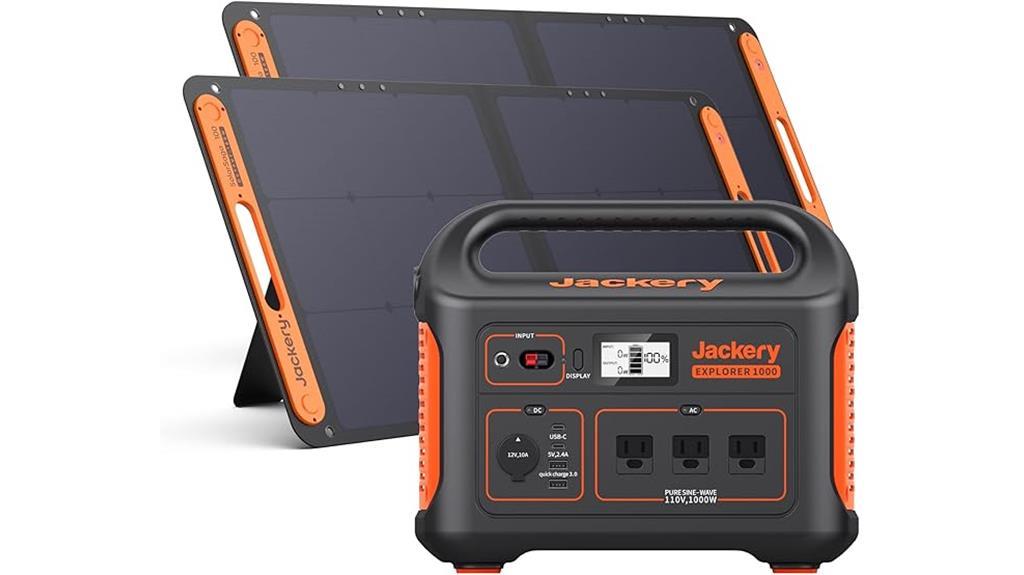
When it comes to reliable energy solutions, the Jackery Solar Generator 1000 stands out as an ideal choice for anyone seeking a dependable backup power source. With a capacity of 1002Wh, it easily powers 90% of home appliances through its three 1000W AC outlets. I appreciate that it comes with two SolarSaga 100W solar panels, allowing for a full charge in just eight hours. Its lightweight design, at only 22 lbs, makes it portable for camping or emergency use. Plus, the smart MPPT controller enhances charging efficiency. I find the pure sine wave inverter essential for protecting my devices, and the impact-resistant construction gives me peace of mind. Overall, it's an excellent option for anyone looking for reliable backup power.
Best For: Those seeking a portable and reliable backup power solution for home, camping, or emergency situations.
Pros:
- Lightweight design at only 22 lbs, making it easy to transport.
- Quick charging with solar panels, achieving full charge in just eight hours.
- Pure sine wave inverter protects sensitive devices from damage.
Cons:
- Fixed handle design limits stacking for storage or transportation.
- Display screen requires manual activation to stay lit continuously.
- Some users desire a more powerful 1500W model for higher energy needs.
EF ECOFLOW Portable Power Station DELTA 2 Max
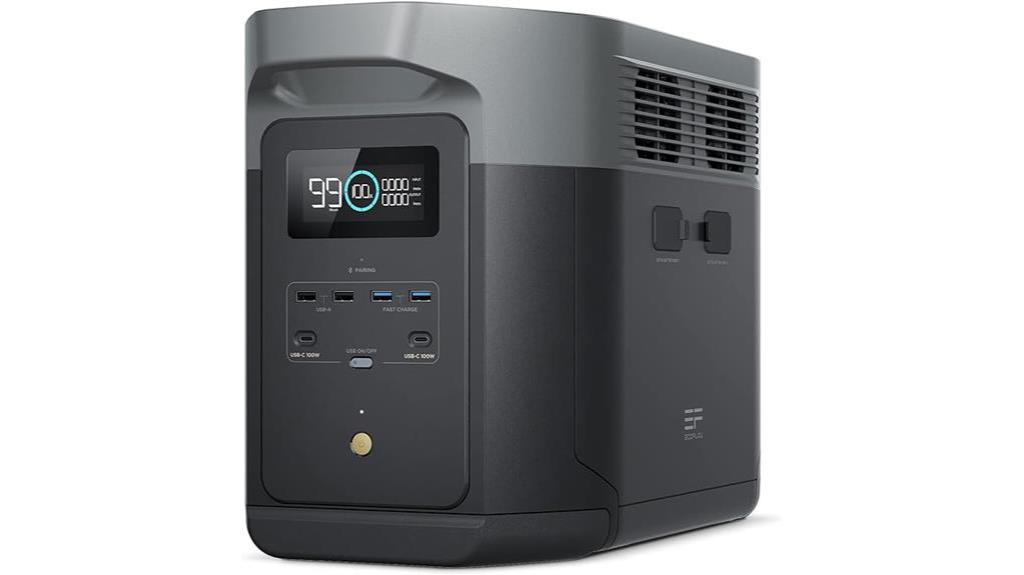
The EF ECOFLOW Portable Power Station DELTA 2 Max stands out as an ideal choice for anyone seeking a reliable power source during emergencies or outdoor adventures. With a powerful output of 2400W and X-Boost mode pushing it to 3400W, it can handle 99% of household devices. I love its robust battery capacity of 2048Wh, providing an impressive 3000 cycles until it reaches 80% capacity. The charging speed is phenomenal; it fully charges in just 1.1 hours via AC. Plus, its 15 output ports cater to all my devices. The user-friendly design and EcoFlow app make monitoring easy. I've found it perfect for camping trips and home backup during outages, giving me peace of mind wherever I am.
Best For: Those seeking a reliable and versatile portable power solution for emergencies, camping, or outdoor activities.
Pros:
- High power output of 2400W (up to 3400W with X-Boost) capable of powering most household devices.
- Fast charging capabilities, reaching full charge in just 1.1 hours via AC.
- User-friendly design with a clear LCD display and EcoFlow app for easy monitoring and management.
Cons:
- Weight may be a concern for some users, making it less portable for certain outdoor activities.
- Initial cost might be higher compared to traditional power solutions.
- Solar charging efficiency can vary depending on weather conditions and panel positioning.
Factors to Consider When Choosing Backup Solar Generators
When choosing a backup solar generator, you should consider several key factors to guarantee it meets your needs. Think about battery capacity and type, charging speed, power output, and portability. Also, check for solar panel compatibility to maximize its efficiency.
Battery Capacity and Type
Choosing the right backup solar generator hinges on understanding battery capacity and type. Battery capacity is typically measured in watt-hours (Wh), and a higher capacity means longer runtimes and the ability to power more devices at once. So, if you plan to run multiple gadgets, look for a generator with a larger capacity.
The type of battery you choose also plays a significant role in performance. LiFePO4 (Lithium Iron Phosphate) batteries provide longer life cycles—over 3000 cycles—and better thermal stability compared to Nickel Manganese Cobalt (NMC) batteries, which only last about 1500 to 2000 cycles. Additionally, LiFePO4 batteries can hold their charge for over 350 days, while NMC batteries typically last around 300 days.
When selecting a solar generator, don't forget to take into account the discharge rate. This affects how quickly the battery releases its stored energy, influencing how long your devices can run. Understanding these factors will empower you to choose a backup solar generator that truly meets your needs, ensuring you've got the power you require, whenever and wherever you need it.
Charging Speed and Options
Understanding battery capacity and type lays the groundwork for evaluating how quickly a backup solar generator can recharge. Charging speed varies notably among models; some can reach full charge in as little as 50 minutes via AC input, while others could take several hours, depending on solar panel size and sunlight availability.
Your choice of solar input capability—ranging from 160W to 500W—directly affects recharge times. Larger solar panels can considerably reduce the time it takes to recharge your generator. Furthermore, consider whether the generator offers pass-through charging, which allows you to power devices while the unit itself is charging. This feature is particularly useful during critical situations when you need immediate power.
The type of battery chemistry also plays a role in charging efficiency. LiFePO4 batteries tend to provide faster charging times and longer lifespans compared to other lithium-ion types. Finally, keep in mind the total output capacity, as it influences how many devices can be charged simultaneously. If multiple devices are connected, this can impact the overall charging speed, so it's vital to choose a generator that meets your needs effectively.
Power Output and Ports
Evaluating power output and port options is vital for selecting the right backup solar generator for your needs. Start by considering the continuous power output, which typically ranges from 800W to 2400W. This rating determines how many devices you can run simultaneously and their size. Don't overlook surge power ratings, either; many generators offer higher peak outputs (like 1600W to 3400W) for short bursts to handle appliances with high startup loads, such as refrigerators or power tools.
Next, evaluate the number and types of output ports available. Look for a mix of AC, USB-A, USB-C, and 12V options to guarantee compatibility with all your devices. The total capacity measured in watt-hours (Wh) is also important, as it indicates how long the generator can power your appliances. Capacities can vary widely, from around 500Wh to over 2000Wh.
Lastly, consider the expandability of the generator. Some models allow you to add extra battery packs, which can greatly increase your total energy storage and output capabilities, making them more versatile for larger power needs.
Portability and Weight
While portability is crucial for many users, especially those planning outdoor adventures or preparing for emergencies, the weight of a backup solar generator can greatly influence your decision. When choosing one, consider that most portable models weigh between 17 to 22 lbs, making them easier to transport. Opting for a lightweight design, around 17 lbs, can considerably enhance your mobility without sacrificing performance.
Built-in handles can make a significant difference, enabling you to carry the generator more easily during outdoor activities or in urgent situations. It's also important to check the generator's dimensions to verify it fits your storage and transport needs; some models may be bulkier than others, even if they share similar weights.
Solar Panel Compatibility
How do you confirm your backup solar generator works efficiently with your solar panels? First, check the wattage of your solar panels and make certain it matches or is compatible with the generator's solar input capacity. This alignment is vital for maximum charging efficiency. Keep in mind that many solar generators accept various panel types, but it's important to verify compatibility with specific brands or models to prevent performance issues.
Consider the efficiency of the solar panels you choose. Panels with higher conversion rates will maximize energy generation, particularly in low sunlight conditions. If you want to enhance usability during emergencies, look for generators that support pass-through charging, allowing you to power devices while simultaneously charging from solar panels.
Lastly, check if the solar generator has adjustable input settings. This feature lets you accommodate different solar panel configurations, providing you flexibility in how you source power. By taking these factors into account, you can confirm that your backup solar generator works seamlessly with your solar panels, giving you reliable power whenever you need it.
Durability and Weather Resistance
When you're choosing a backup solar generator, durability and weather resistance are vital factors that can greatly impact your outdoor experience. Look for models with an IP68 weatherproof rating. This guarantees protection against dust and water immersion, making them perfect for unpredictable outdoor conditions.
You should also consider the material and construction quality; a robust design can withstand drops and impacts, which is pivotal when you're on the move. Evaluate the temperature range performance, too. Generators equipped with LiFePO4 battery technology can operate effectively in extreme temperatures from -4°F to 176°F, assuring reliability in various climates.
Don't overlook the durability of the solar panels themselves. Choose panels that feature industry-leading conversion rates and resilience against environmental factors, as these can markedly affect your energy collection efficiency. Finally, check for a solid warranty—five years or more is ideal. A strong warranty indicates the manufacturer's confidence in the product's durability and longevity. By keeping these factors in mind, you can select a backup solar generator that stands the test of time, providing you with reliable power whenever and wherever you need it.
User Interface and Controls
After guaranteeing the durability and weather resistance of your backup solar generator, the next aspect to contemplate is the user interface and controls. A clear and intuitive interface is vital for monitoring power input/output and battery status effectively. You want to enhance your overall experience by easily accessing real-time data, which helps you manage energy consumption and confirm you're using the battery's capacity efficiently.
Look for display screens that provide extensive insights into your energy use, allowing you to make informed decisions. App connectivity is a significant feature; it enables remote management, so you can monitor and adjust settings from a distance. User-friendly controls will make shifts between power sources—like wall power to battery power—seamless and hassle-free.
Additionally, design features such as illuminated controls and straightforward navigation are important, especially for outdoor activities or low-light conditions. A well-designed user interface not only improves usability but also empowers you to maximize the performance of your backup solar generator. Keep these factors in mind to guarantee you choose a generator that meets your needs effortlessly.
Expandable Power Options
Expandable power options are vital for anyone looking to maximize the efficiency and versatility of their backup solar generator. By choosing a system with expandable capacity, you can increase your energy storage from a base level, accommodating your varying power needs during outages or outdoor activities. Many solar generators support the addition of extra battery packs, allowing you to boost your total energy capacity from 1kWh to as much as 6kWh. This flexibility is essential for powering larger appliances when you need it most.
With expandable power options, you can greatly extend the operational time of your devices. You'll be able to charge additional batteries simultaneously, ensuring your critical equipment keeps running longer. Plus, starting with a smaller system and scaling up over time can lead to cost savings, as you won't have to invest in a new generator every time your energy requirements grow.
When selecting a solar generator, look for models that allow you to connect multiple units or batteries. This feature provides the flexibility to meet your future energy demands without the hassle of replacing your entire system, ensuring you're always prepared for whatever comes your way.
Frequently Asked Questions
How Long Do Solar Generators Typically Last?
Solar generators typically last around 5 to 15 years, depending on their quality and maintenance. You'll find that the lifespan of the batteries plays a vital role, as they often degrade over time. Regular care, like keeping them clean and storing them properly, can extend their use. If you're using high-quality solar panels and batteries, you can expect them to last on the longer side of that range, giving you reliable power for years.
Can Solar Generators Power Appliances During a Blackout?
Yes, solar generators can power appliances during a blackout, provided they're adequately sized for your needs. You'll want to check the wattage of your appliances to guarantee your generator can handle the load. Most solar generators are great for smaller devices like lights and phones, but larger appliances might require a more powerful unit. Just make certain you've charged it beforehand, and you'll have reliable power when you need it most.
How Long Does It Take to Charge a Solar Generator?
Did you know that on average, solar generators can fully charge in about 8 to 12 hours? The exact time it takes to charge your solar generator depends on factors like the sunlight intensity and the generator's capacity. If you're in direct sunlight, you might notice faster charging times. It's essential to monitor the battery level and plan ahead, so you'll have enough power when you need it most during an outage.
Are Solar Generators Environmentally Friendly?
Yes, solar generators are environmentally friendly. They harness sunlight to produce electricity, reducing reliance on fossil fuels and minimizing greenhouse gas emissions. You'll appreciate that they operate quietly and leave no harmful residue, making them cleaner than traditional generators. Plus, since they use renewable energy, you're contributing to a sustainable future. By choosing a solar generator, you're not just powering your devices, but also protecting the planet for future generations.
What Is the Maintenance Required for Solar Generators?
You might think that once you've got a solar generator, it's smooth sailing, but maintenance is key to keeping it running efficiently. Regularly check and clean the solar panels to maximize sunlight absorption. Inspect the battery for corrosion and guarantee connections are tight. It's also wise to run the generator periodically to keep it in good shape. By staying proactive, you'll enjoy reliable power whenever you need it without unexpected surprises.
Wrapping Up
To summarize, investing in a backup solar generator can really enhance your energy independence, especially considering that solar energy can reduce your electricity bills by up to 75%. With options like the EF ECOFLOW and Jackery generators, you've got powerful choices to keep your devices running wherever you are. So, whether you're camping or facing a power outage, you'll be ready to power up anywhere, anytime. Don't wait—explore your options today!
